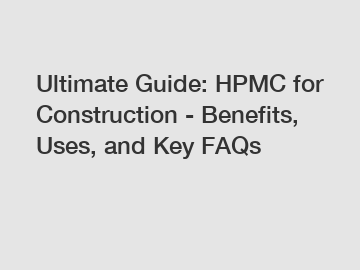Dec. 12, 2023
Chemicals
Ultimate Guide: HPMC for Construction - Benefits, Uses, and Key FAQs.
In recent years, there has been a growing demand for advanced construction materials that offer enhanced performance, sustainability, and ease of use. One such material that has gained significant popularity in the construction industry is Hydroxypropyl Methylcellulose (HPMC). Its unique properties make HPMC an ideal choice for various construction applications. In this ultimate guide, we will explore the benefits, uses, and answer some key FAQs related to HPMC in construction.
Benefits of HPMC in Construction.

1. Improved Workability: HPMC acts as a thickening agent and provides excellent workability to construction materials such as cement-based mortars, gypsum-based plasters, and self-leveling flooring compounds. It enhances the spreadability, adhesion, and water retention capabilities of these materials, leading to better workability and improved application properties.
2. Water Retention: One of the key benefits of HPMC is its ability to retain water. It forms a thin film on the surface of the construction material, which slows down water evaporation during the curing process. This ensures uniform hydration, reduces cracking, and enhances the overall strength and durability of the construction material.
3. Improved Bonding: HPMC enhances the adhesive properties of construction materials, making them stick better to a wide range of substrates. It improves the bond strength and reduces the risk of debonding or delamination, especially in tile adhesives, renders, and skim coats.
4. Enhanced Crack Resistance: By improving the flexibility and toughness of construction materials, HPMC helps in reducing shrinkage cracks. It minimizes the risk of cracking caused by internal stresses and temperature fluctuations, resulting in more durable and aesthetically appealing structures.
Uses of HPMC in Construction.
1. Tile Adhesives: HPMC is extensively used in tile adhesives to enhance workability, reduce slip, and improve the bond strength between tiles and the substrate. It ensures proper water retention, allowing sufficient time for tile fixing while preventing excessive drying.
2. Renders and Plasters: HPMC is widely incorporated into renders and plasters to improve workability, crack resistance, and adhesion. It helps in achieving a smooth and even surface finish, and also contributes to the durability and longevity of the plaster or render.
3. Self-Leveling Flooring Compounds: HPMC is added to self-leveling flooring compounds to control the flow characteristics and prevent segregation. It improves the leveling ability, avoids cracking, and ensures a high-quality finish.
Further reading:4. Grouts and Joint Fillers: HPMC improves the workability and water retention of grouts and joint fillers. It enhances their ability to fill small gaps and provides good color stability and water resistance.
Key FAQs about HPMC in Construction.
1. Is HPMC safe for construction applications?
- Yes, HPMC is a non-toxic and environmentally friendly substance. It is safe to use in construction as it does not release any harmful chemicals.
2. Can HPMC be used in exterior applications?
- Yes, HPMC is suitable for both interior and exterior applications. It offers excellent resistance to moisture, UV rays, and other environmental factors.
3. How can the dosage of HPMC be determined?
- The dosage of HPMC depends on various factors such as the desired properties, application requirements, and the specific construction material being used. It is recommended to consult the manufacturer's guidelines or seek professional advice for accurate dosage instructions.
4. How long does it take for HPMC to dissolve in water?
- HPMC dissolves quickly in water, typically within a few minutes of agitation.
In conclusion, HPMC offers numerous benefits and applications in the construction industry. Its workability improvements, water retention capabilities, and enhanced bonding properties make it an excellent choice for a variety of construction materials. Whether for tile adhesives, renders, self-leveling compounds, or grouts, HPMC plays a crucial role in enhancing performance and durability. For more information or inquiries about HPMC for construction, please feel free to contact us.
If you want to learn more, please visit our website hpmc powder factory, hpmc powder factory, hpmc powder factory.
Further reading:Related Articles
If you are interested in sending in a Guest Blogger Submission,welcome to write for us!
All Comments ( 0 )